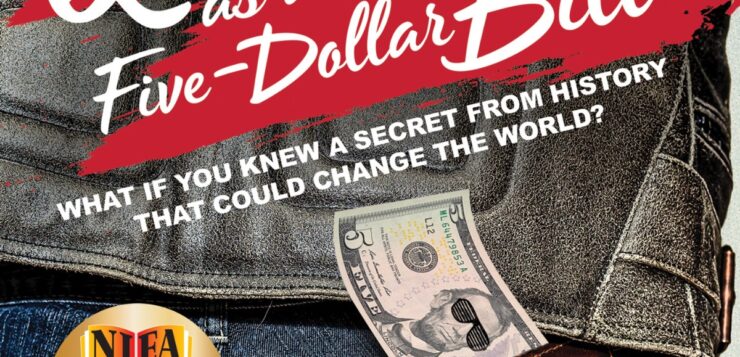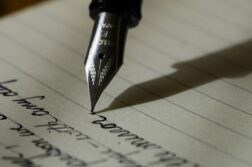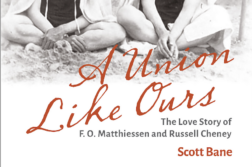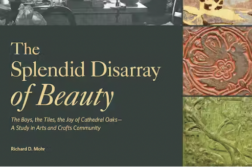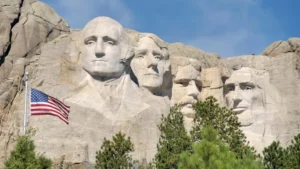
I admit it: I’ve got some issues with history. Growing up, history was presented as just the stories of white, straight, cis, able-bodied, rich, Christian men from Europe. It was endless names and dates to memorize. It had nothing to do with me or my life, and that made me feel even more alone. It made me feel like I was the first guy to ‘like-like’ another guy, ever.
The exact moment I figured out I was gay still sparkles in my memory. I was eleven years old when I saw this twenty-something guy who was so beautiful, and I thought, I wanna grow up to be the kind of guy this guy would smile at and flirt with.
Sadly, the sparks only lasted five minutes, until I realized I had to keep that truth about me a secret from the people who were supposed to love me most: my family. I was closeted for the next fourteen years.
In high school, college, and grad school, I dated girls; and while I thought dating them was the right thing to do (it was what my parents and society wanted), I didn’t know how I was supposed to feel. I finally decided to be honest with myself and others, and came out at 25.
About ten years later, I heard a talk by Randy Harrison (the gay activist, not the actor) where he spoke about the letters Abraham Lincoln wrote to Joshua Fry Speed, and how they convinced him and others that Abraham had been in love with Joshua.
It seemed impossible. President Abraham Lincoln? The guy on Mount Rushmore? On the penny? On the five-dollar bill? But I couldn’t get it out of my mind, so I got a book from the library with Abraham’s letters to Joshua, and while flipping through it landed on this one line: “Are you now in feeling as well as in judgment glad that you are married as you are?” Abraham wrote Joshua on October 5, 1842 eight months later, after having lived together for four years, at which time Joshua moved back to Kentucky and married a woman named Fanny.
There was a reflection of me, in history. That was exactly how I had felt. Exactly what I had wanted to know. It was a moment that changed my whole life. I dug into more primary sources, and became convinced: Abraham really did love Joshua. It was the first time (of many) that I said, “No way, they were gay?”
Lacking a time machine to go back and tell my closeted young self, I’m paying it forward now. I wrote, crowdfunded, and published a YA novel, Queer As A Five-Dollar Bill, about a closeted teen guy, Wyatt, who lives in a homophobic, small town and is dating a girl who’s also his best friend. Wyatt stumbles upon the same Lincoln letter I did, and has the same moment of goosebump recognition. And then Wyatt outs Abraham Lincoln on a blog, and it blows up in a huge conservative backlash and media firestorm.

I took all the evidence of Lincoln loving Joshua and made it one chapter in a nonfiction book for ages 11 and up, No Way, They Were Gay?: Hidden Lives and Secret Loves. It was going to be published by an imprint of Simon & Schuster, but two weeks after President Trump was elected, they cancelled the book. Putting out a book for kids saying Lincoln was gay was too scary for them. It took years, but in 2021 it was finally published by the brave folks at Zest Books/Lerner Publishing Group. It uses primary sources to tear down that false façade of history, shining a spotlight on men who loved men, women who loved women, people who loved without regard to gender, and people who lived outside the gender binary, across time and around our world.
Our queer legacy includes Eleanor Roosevelt loving another woman, Lorena Hickok; Mohandas Gandhi (yeah, that Gandhi) loving another man, Hermann Kallenbach; and the pharaoh Hatshepsut, who changed their public presentation of gender over the 22 years they ruled ancient Egypt, from presenting as a woman, to an in-between gender, to presenting as a man. Again and again while doing the research, I kept saying, “No way, they were gay?”
I remember my shock reading the editor Hallett Smith’s explanation in my husband’s copy of The Riverside Shakespeare about how the Sonnets were changed in 1640 so the 126 love poems addressed to a young man would be seen as having been written to a woman. And how for 150 years, that was the version of Shakespeare’s sonnets that the world knew. And how, in The Riverside Shakespeare, they were proudly presenting the Sonnets as originally written. But then, not so proudly, Smith cautioned readers in 1974 not to confuse the “platonic” love between men expressed in these 16th century poems with 20th century “homosexual attachment.” Really? I learned I had to go around the historians that hid the Queer truth and look to the primary sources themselves. Let these people from the past speak directly to me, and listen. And what they said was amazing. Even the first lines of Sonnet 144 lays it out clearly, that Shakespeare was in love with a guy and a woman who doesn’t seem to be his wife: “Two loves I have of comfort and despair, Which like two spirits do suggest me still; The better angel is a man right fair, The worser spirit a woman color’d ill….”
With the recent onslaught of legislation preventing kids and teens from learning about queer history, and the book banning targeting books like mine, I was trying to figure out what I could do. How could I help get the word out about our Queer history if my books (even though they’ve won awards, even though they could change lives for the better) are being blocked from schools and libraries? And I thought about the audiobook for Queer As A Five-Dollar Bill, brilliantly narrated by Michael Crouch, and how nobody’s banning podcasts…

And that’s how Queer As A Five-Dollar Bill: The Podcast came to be. Chapter by chapter, the book in its entirety is streaming to empower Queer teens and their allies with the real-world information that would have changed my life. Because stories – especially our Queer stories and history – should be available for all.
They are banning books about Queer history and people because books are “empathy machines”. They help us feel seen ourselves, and they help others see the shared humanity of people who on the surface might appear so different.
If the people in power can prevent people from feeling empathy for each other, they can keep everyone divided and consolidate their hold on power. By making stories of Queer lives and loves illegal, unspeakable to children, they aim to push Queer people back into the closet.
One of my heroes from all my research was Bayard Rustin, a Black and openly out leader in the civil rights movement. He’s the guy who taught Martin Luther King, Jr. about nonviolent protest. He’s the guy who organized the famous march on Washington where Dr. King gave his “I Have a Dream” speech. Bayard said in 1986: “There is a small percentage of people in America who understand the true nature of the homosexual community. There is another small percentage who will never understand us. Our job is not to get those people who dislike us to love us. Nor was our aim in the civil rights movement to get prejudiced white people to love us. Our aim was to try to create the kind of America, legislatively, morally, and psychologically, such that even though some whites continued to hate us, they could not openly manifest that hate. That’s our job today: to control the extent to which people can publicly manifest antigay sentiment.”
Bayard could have said that yesterday. Bayard was asked in 1986 if he had advice for other Black gay activists, and he replied, “they should try to build coalitions of people for the elimination of all injustice. Because if we want to do away with the injustice to gays it will not be done because we get rid of the injustice to gays. It will be done because we are forwarding the effort for the elimination of injustice to all. And we will win the rights for gay, or blacks, or Hispanics, or women within the context of whether we are fighting for all.”
So much of my journey as a gay man has been realizing I have to be an ally to every other person represented by our community’s LGBTQIA2+ acronym, and beyond: to women, to people of color, to Indigenous people, to disabled people, to poor people, and to religious and non-religious minorities. Because when we all stand together, we are stronger than the people in power.
Together, we can change our world for the better. And it really needs changing.
Once we know we have a past, we know we deserve a place at the table today. And when we know we have a place at the table today, the future possibilities are infinite.
And that’s a legacy we can all be proud of.
 Lee Wind (he/him) writes stories to empower kids and teens to be their authentic selves and change the world – the same books that would have changed his life as a young gay, Jewish kid. Queer as a Five-Dollar Bill: The Podcast is available everywhere you listen to podcasts, and the Lincoln chapter from No Way, They Were Gay?, with all the evidence of Abraham Lincoln loving another man, is available as a free PDF download on the author’s website.
Lee Wind (he/him) writes stories to empower kids and teens to be their authentic selves and change the world – the same books that would have changed his life as a young gay, Jewish kid. Queer as a Five-Dollar Bill: The Podcast is available everywhere you listen to podcasts, and the Lincoln chapter from No Way, They Were Gay?, with all the evidence of Abraham Lincoln loving another man, is available as a free PDF download on the author’s website.


